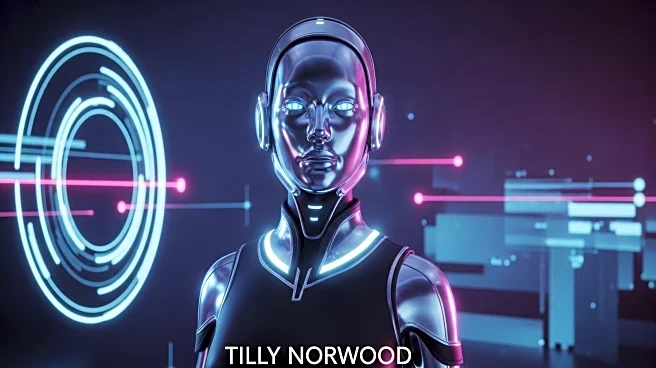What's Happening?
At the Zurich Film Festival, Eline Van der Velden, founder and CEO of AI production house Particle6 and its subsidiary talent studio Xicoia, announced interest from talent agents in Tilly Norwood, an AI-generated 'actress.' Tilly Norwood is a digital avatar created by Xicoia, designed to perform tasks such as engaging in unscripted conversations and adapting to platform-specific audiences. Despite the buzz, Tilly Norwood is not a real person but an animated avatar controlled by AI models trained on footage of actual people. The avatar's rollout has generated significant attention, with discussions about its potential to become a normalized concept in the entertainment industry.
Why It's Important?
The introduction of AI-generated actors like Tilly Norwood raises significant concerns within the entertainment industry. Organizations such as SAG-AFTRA have expressed worries about the impact on human performers, highlighting the risk of AI replacing traditional acting roles and devaluing human artistry. The potential normalization of digital actors could lead to a shift in how entertainment content is produced, potentially reducing opportunities for real actors and altering the industry's landscape. This development underscores the broader implications of AI in creative fields, where technology may complement or compete with human expertise.
What's Next?
As Xicoia continues to promote Tilly Norwood, the entertainment industry may face increased pressure to adapt to AI-driven changes. If digital avatars secure talent representation, it could signal a shift towards accepting AI constructs in roles traditionally held by humans. This may prompt discussions among industry stakeholders about ethical considerations and the future of human employment in creative sectors. The ongoing debate may lead to regulatory scrutiny and potential policy changes to address the challenges posed by AI in entertainment.
Beyond the Headlines
The emergence of AI-generated actors like Tilly Norwood highlights ethical and cultural dimensions, such as the authenticity of performances and the value of human creativity. The concept of digital actors challenges traditional notions of artistry and raises questions about intellectual property rights and the use of AI-generated content. As the technology evolves, it may influence cultural perceptions of entertainment and redefine the relationship between technology and human creativity.










